Photographs: Issei Kato/Reuters
Japan is the most democratic nation in Asia, according to a report published by the World Democracy Audit.
The organisation ranks nations on how they fare in terms of granting political rights, civil liberties and press freedom.
The world's second largest economy fared well in the fields of political rights and civil liberties, but lagged behind in press freedom.
It failed to win a slot among the 28 countries in division 1. But at the 29th slot (which is division 2), it still scored the highest in Asia.
India
Image: Voters wait outside a polling station in Rohania, Uttar PradeshPhotographs: Adnan Abidi/Reuters
India is the 47th most democratic nation according to the study. Though the world's largest democracy fares reasonably well in the fields of political rights and civil liberties, it only finds a place at the 45th slot in terms of press freedom. This low ranking is surprising as India prides itself on granting absolute freedom to the press and lack of restrictions on the media.
Its performance in tackling corruption also leaves a lot to be desired, as it ranks below 63 countries in the corruption index.
India is considered to be one of the most corrupt nations of the world, where the malice of corruption is deeply embedded in all three arms of the government -- the bureaucracy, the judiciary and the legislature.
Pakistan
Image: A man prays in the courtyard of the Data Darbar Sufi shrine in LahorePhotographs: Adrees Latif/Reuters
Pakistan is ranked way, way below the list at the 106th slot. The beleaguered country fares poorly in granting political rights and civil liberties to its citizens. The level of freedom to the press is also nothing to write home about, as Pakistan is at the 98th position. The country also suffers from high levels of corruption: it is ranked 111th among 150 nations.
It lags behind countries like Burkina Faso, Bosnia and Herzegovina and Malawi, which are either suffering under a dictatorship or are desperately poor.
Pakistan has been rattled by a series of suicide attacks by home-grown militants, who have now turned against their creators. It has also faced intense pressure from its so-called ally -- the United States -- to take stricter steps against these militants, even at the cost of civilian lives.
To make matters worse, Pakistan always seems to totter on the precipice of s dictatorship, thanks to its history of long spells of military rule interspersed by the reign of weak civilian governments.
China
Image: Performers dressed as terracotta warriors parade in ShanghaiPhotographs: Reuters
The future economic superpower finds itself at a poor 121st position. Though its ability to deal with corruption is reasonably decent (60th slot), China ranks near the bottom of the list in terms of granting civil liberties and political rights.
The Communist nation has been repeatedly criticised by Western nations and the United States for its controversial human rights record. Those who question the government, its policies or objectives often find themselves behind bars, mostly for completely ludicrous charges.
China also keeps its press under a tight control, and fares at an abysmal 138th position in the field of press freedom. The nation barely has any independent media publications, and news is disseminated by state-run dailies which pursue their own agendas.
The Chinese government also keeps a hawk's eye on books, magazines and newsletters to ensure that no incriminating material contradicting the government's propaganda sees the light of day. The authorities have also attracted scorn for trying to censor Google searches, social networking sites and other websites.
Afghanistan
Image: Afghan boys watch a US patrol team in Arghandab District, north of KandaharPhotographs: Bob Strong/Reuters
One of the world's most failed nations finds itself at the 138th position in the list. Torn apart by its bloody history and bloodier present, Afghanistan's attempts to hobble back to democracy have been rocky. The civilian government, led by the unpredictable Hamid Karzai, is made up of warlords who are trying to regain their turfs.
Among the 150 nations on the list, Afghanistan ranks at no. 148 due to the devastating levels of corruption rampant in the administration. It scores woefully low in terms of granting political rights and civil liberties to its citizens.
The elections held in August 2009, which ensured Karzai's return to power, were highly controversial as it was alleged that it had been rigged by the President and his militiamen.
At the 121st slot, Afghanistan also fares poorly in terms of press freedom. According to a recent study, it is one of the most dangerous places for journalists, due to the many cases of murders of international correspondents in the country.
Myanmar
Image: Young Buddhist monks at a monastery near Pyar Pon township in MyanmarPhotographs: Soe Zeya Tun/Reuters
Myanmar is the least democratic nation on earth according to the organisation. For the last 20 years, the country has been ruled by the ruthless military regime of the junta, which has crushed any attempts by the opposition parties to reintroduce democracy.
The citizens of Myanmar have no political rights or civil liberties whatsoever. There is practically no concept of freedom of press, and it ranks only one slot better than Afghanistan in terms of corruption (147th).
Along with an inconsiderate junta regime, the people of Myanmar also have to put up with extremely high levels of corruption, as most privileges are usurped by the military leaders and their cronies.
Bowing down to intense international pressure and the threat of severe sanctions, Myanmar has agreed to hold elections soon, though the United Nations has already expressed doubts about whether the elections will be fair and legitimate.

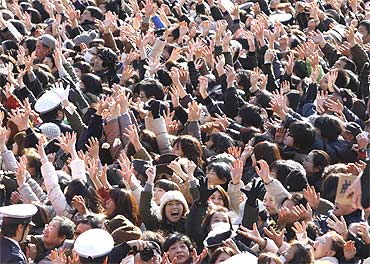
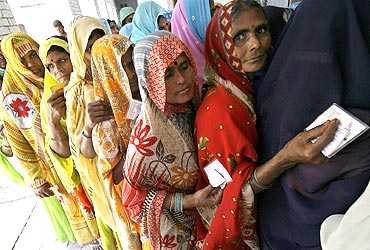
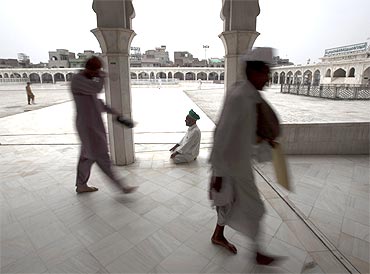
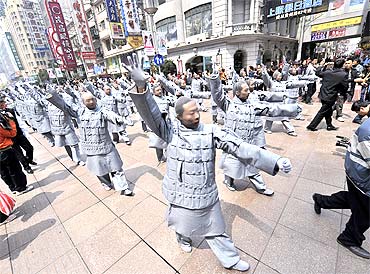

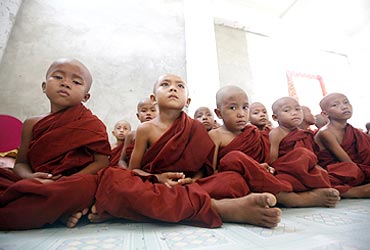
article